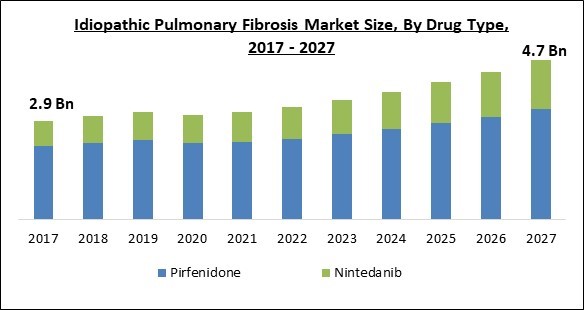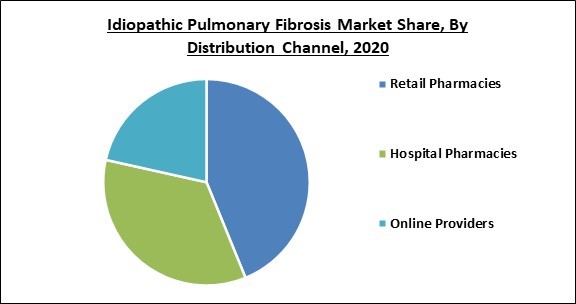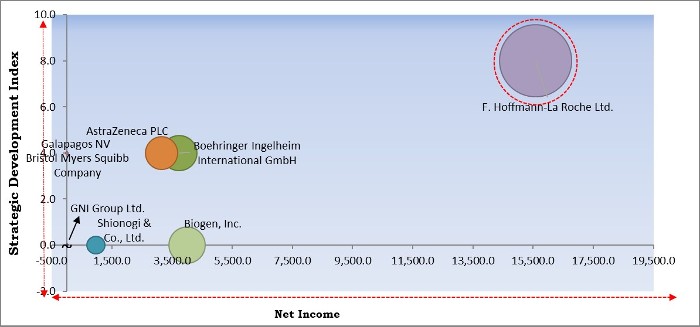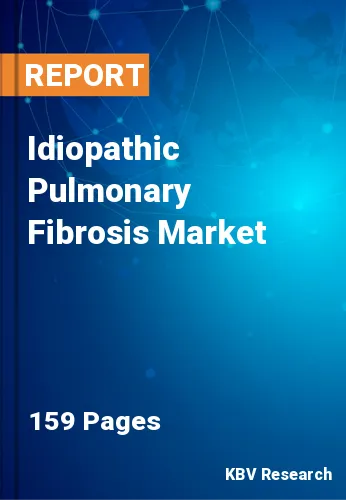The Global Idiopathic Pulmonary Fibrosis Market size is expected to reach $4.7 billion by 2027, rising at a market growth of 6.9% CAGR during the forecast period.
Idiopathic pulmonary fibrosis (IPF) refers to a type of chronic lung disease wherein the lungs' tissues thicken and stiffen with time. The brain and other organs do not receive adequate oxygen due to the thickening of lung tissues. This disorder causes scar tissue (fibrosis) to form in the lungs, preventing the lungs from adequately transporting oxygen into the bloodstream. People between the ages of 50 and 70 are most commonly affected by the condition. Idiopathic pulmonary fibrosis is a type of interstitial lung disease (commonly known as ILD), a group of lung disorders characterized by inflammation or scarring in the lungs.
Some of the growth catalysts for the market are increased demand for ideal drugs for treating idiopathic pulmonary fibrosis, and favorable reimbursement policies provided by manufacturers and insurance providers in some countries. In addition, the prevalence of the fibrotic disease is on the rise, growing elderly population, and technological breakthroughs in cancer screening and detection are the key trends of the industry. On the other hand, the lack of appropriate disease treatment alternatives, on the other hand, limits market expansion.
In addition, some of the growth factors for the Idiopathic Pulmonary Fibrosis market are the surge in demand for cost-effective pharmaceuticals and the development of improved treatment options and
an increase in the number of people who smoke cigarettes enhances market growth. However, the lack of therapeutic alternatives that can entirely cure the disease would hamper the growth of the idiopathic pulmonary fibrosis market.
IPF affects about 100,000 people in the United States, according to the National Institutes of Health, and 30,000 to 40,000 new cases are discovered each year. IPF is expected to have a global incidence of 10.7 cases per 100,000 person-years in males and 7.4 cases per 100,000 person-years in females. Idiopathic pulmonary fibrosis is expected to affect 20 instances per 100,000 people in men and 13 cases per 100,000 people in women.

Coronavirus (COVID-19) was discovered in Wuhan, Hubei Province, China, in December 2019. The disease is caused by the severe acute respiratory syndrome coronavirus 2 (SARS-CoV-2) virus, which is spread between people.
The virus quickly spread across the globe after its discovery in Wuhan. Moreover, this virus causes a variety of symptoms in individuals, ranging from minor to severe. Fever, dry cough, and exhaustion are some of the most prevalent symptoms. Breathing difficulties or shortness of breath, chest pain or pressure, and lack of speech or movement are all dangerous signs. Further, the virus has a significant fatality potential in the elderly population. COVID-19 has been classified as a pandemic by the World Health Organization (WHO) as of March 11, 2020. In addition, only a few vaccinations have been approved for COVID-19 prophylaxis on an emergency basis. As a result, the most crucial approach to inhibit the development of this disease is social distance. Furthermore, numerous countries around the world have implemented state-wide lockdowns in order to maintain social distance.
The increased global prevalence of cancer, rising healthcare costs, and increasing diagnoses have resulted in a vast patient pool undergoing screening procedures. Lung cancer, for example, is the second most prevalent cancer in both women and men, and is expected to impact over 235,000 persons in the United States by 2020, according to the American Society of Clinical Oncology (2020). According to Globocan (Global Cancer Observatory), 64,804 new cases of cancer would be reported in Germany year 2020. According to the research, lung cancer claimed the lives of over 50,000 people in the country, making it the leading cause of death from cancer.
IPF is a deadly disease that worsens over time and primarily affects the elderly with several comorbidities. Pirfenidone from Genetech and nintedanib from Boehringer Ingelheim Pharma are licensed pharmaceuticals for the treatment of IPF. These treatments help patients live longer by slowing the rate of lung function decline. Pirfenidone has been utilized in over 42,000 people around the world and has anti-fibrotic and anti-inflammatory characteristics. Both drugs are effective in slowing the progression of the condition.
A variety of medicines for IPF are now undergoing clinical testing. For example, MediciNova's Tipelukast is a tiny bioavailable molecule with anti-fibrotic and anti-inflammatory properties, that is designed to suppress gene expression and promote IPF. Interventional tests on the medication are currently in phase 2. Similarly, FibroGen's Pamrevlumab is an antibody-based treatment for IPF that is currently in phase 3 clinical trials.
IPF is acknowledged to be one of the rare diseases, with a high healthcare expense that is disproportionate to the disease's prevalence. Because of the high cost of drugs and treatments for idiopathic pulmonary fibrosis, a majority of people are hesitant to use or continue taking them. As a result, the high cost of such treatments makes them unaffordable for people belonging to the low-income category.
In addition, many countries lack awareness and treatment options for IPF. Further, many countries still lack appropriate healthcare infrastructure that devoid their citizens of basic and advanced healthcare services. Considering these aspects, in spite of a large number of people suffering from IPF, a very low number of people get appropriate treatments. Further, many people work in an environment that forces them to breathe in the existence of dust like asbestos fibers, coal dust, silica dust, and metal dust. As a result, such people are more vulnerable to developing lung-related diseases. Hence, these factors are anticipated to slow down the growth of the overall Idiopathic Pulmonary Fibrosis Market during the forecasting period.

Based on Drug Type, the market is segmented into Pirfenidone and Nintedanib. In 2020, the Pirfenidone segment acquired the largest revenue share of the Idiopathic Pulmonary Fibrosis Market. This is due to the increased use of pirfenidone drugs such as Esbriet and Pirespa around the world. In experimental models of pulmonary fibrosis, this medication possesses a combination of anti-inflammatory, antioxidant, and antifibrotic properties, making it a promising drug with treatment potential for IPF.
Based on Distribution Channel, the market is segmented into Retail Pharmacies, Hospital Pharmacies, and Online Providers. The Hospital Pharmacies segment acquired a significant revenue share of the Idiopathic Pulmonary Fibrosis Market in 2020. The main objective of a hospital pharmacy is to keep track of how pharmaceuticals are used in hospitals and other medical facilities. Moreover, these pharmacies help improve patient outcomes with the help of pharmaceutical selection, prescription, procurement, delivery, administration, and review.
| Report Attribute | Details |
|---|---|
| Market size value in 2020 | USD 3 Billion |
| Market size forecast in 2027 | USD 4.7 Billion |
| Base Year | 2020 |
| Historical Period | 2017 to 2019 |
| Forecast Period | 2021 to 2027 |
| Revenue Growth Rate | CAGR of 6.9% from 2021 to 2027 |
| Number of Pages | 159 |
| Number of Tables | 253 |
| Report coverage | Market Trends, Revenue Estimation and Forecast, Segmentation Analysis, Regional and Country Breakdown, Competitive Landscape, Companies Strategic Developments, Company Profiling |
| Segments covered | Drug Type, Distribution Channel, Region |
| Country scope | US, Canada, Mexico, Germany, UK, France, Russia, Spain, Italy, China, Japan, India, South Korea, Singapore, Malaysia, Brazil, Argentina, UAE, Saudi Arabia, South Africa, Nigeria |
| Growth Drivers |
|
| Restraints |
|
Based on Regions, the market is segmented into North America, Europe, Asia Pacific, and Latin America, Middle East & Africa. In 2020, North America emerged as the leading region in the overall Idiopathic Pulmonary Fibrosis Market. This is due to the strong infrastructure for developmental research, the availability of substantial research funds, and the rise in government initiatives for idiopathic pulmonary fibrosis. Moreover, the region is witnessing a growing number of individuals with IPF, thereby boosting the growth of the regional market.
Free Valuable Insights: Global Idiopathic Pulmonary Fibrosis Market size to reach USD 4.7 Billion by 2027

The major strategies followed by the market participants are Partnerships. Based on the Analysis presented in the Cardinal matrix; F. Hoffmann-La Roche Ltd. is the major forerunner in the Idiopathic Pulmonary Fibrosis Market. Companies such as AstraZeneca PLC, Boehringer Ingelheim International GmbH and Galapagos NV are some of the key innovators in Idiopathic Pulmonary Fibrosis Market.
The market research report covers the analysis of key stake holders of the market. Key companies profiled in the report include GNI Group Ltd., Shionogi & Co., Ltd., Mission Therapeutics Ltd., Galapagos NV, FibroGen, Inc., AstraZeneca PLC, F. Hoffmann-La Roche Ltd., Bristol Myers Squibb Company, Boehringer Ingelheim International GmbH, and Biogen, Inc.
By Drug Type
By Distribution Channel
By Geography
The global ldiopathic pulmonary fibrosis market size is expected to reach $4.7 billion by 2027.
The growing rate of Lung Cancer are being developed are driving the market in coming years, however, high cost of treatment and lack of awareness & qualified professionals limited the growth of the market.
GNI Group Ltd., Shionogi & Co., Ltd., Mission Therapeutics Ltd., Galapagos NV, FibroGen, Inc., AstraZeneca PLC, F. Hoffmann-La Roche Ltd., Bristol Myers Squibb Company, Boehringer Ingelheim International GmbH, and Biogen, Inc.
The Retail Pharmacies segment has acquired maximum revenue share in the Global Idiopathic Pulmonary Fibrosis Market by Distribution Channel 2020, thereby, achieving a market value of $1.9 billion by 2027.
The North America is the fastest growing region in the Global Idiopathic Pulmonary Fibrosis Market by Region 2020, and would continue to be a dominant market till 2027; thereby, achieving a market value of $1.7 billion by 2027.
Our team of dedicated experts can provide you with attractive expansion opportunities for your business.

